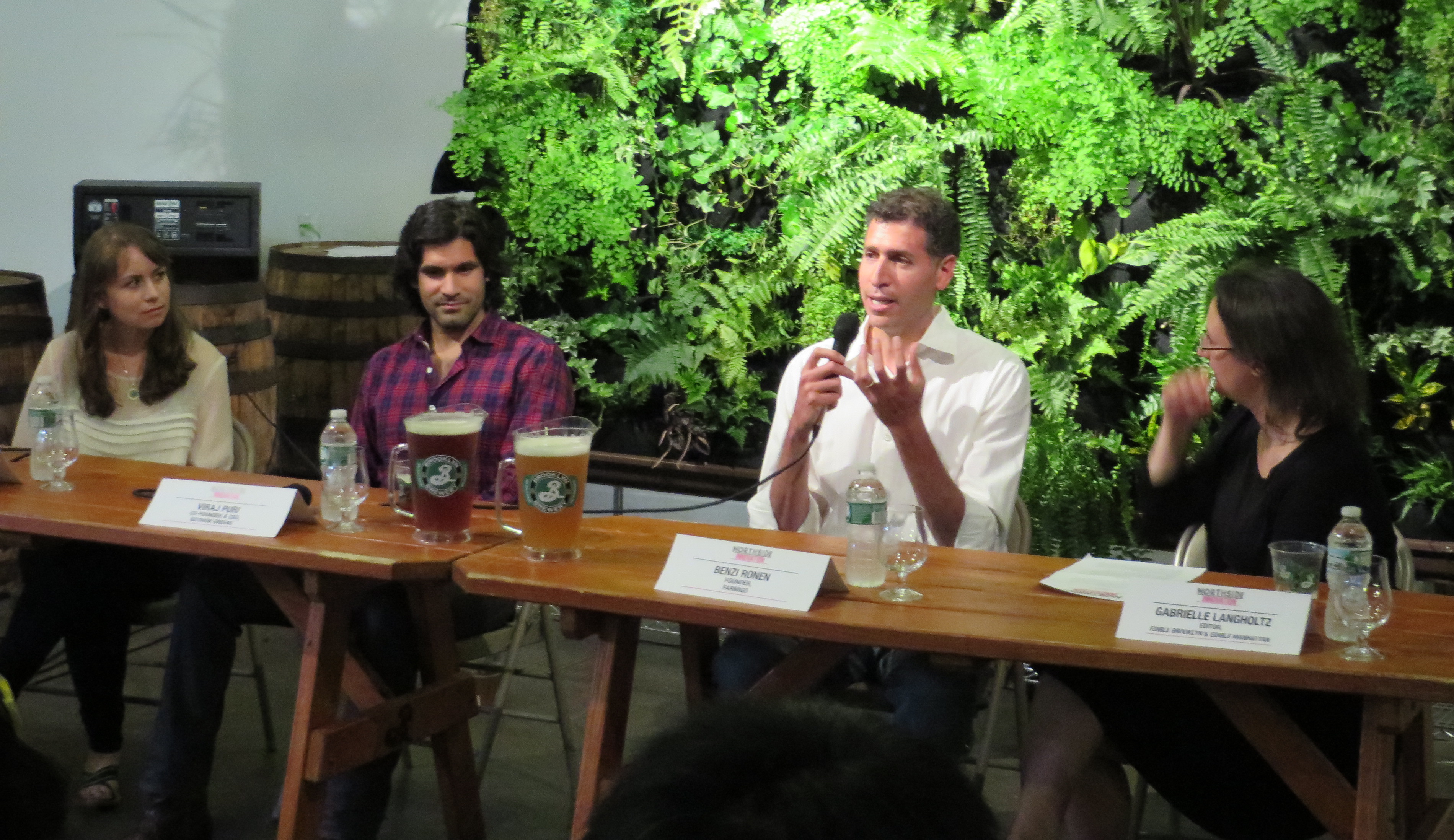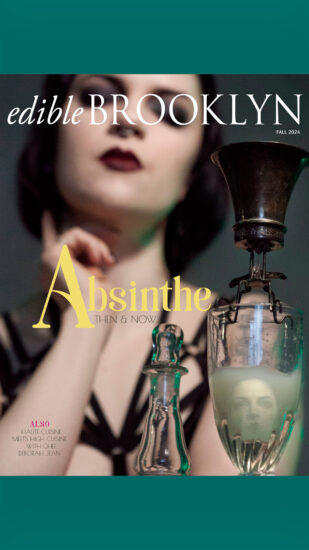 Erin Zimmer from Good Eggs (left) and Gotham Greens co-founder Viraj Puri look on as Farmigo founder Benzi Ronen talks about the emotional and community impact that his localized farming site has on both consumers and farmers. Moderator (and our Edible Manhattan editor) Gabrielle Langholtz looks on, right.
Erin Zimmer from Good Eggs (left) and Gotham Greens co-founder Viraj Puri look on as Farmigo founder Benzi Ronen talks about the emotional and community impact that his localized farming site has on both consumers and farmers. Moderator (and our Edible Manhattan editor) Gabrielle Langholtz looks on, right.
For Sean Dimin, it all started when he became fascinated by the fishermen he met while on family vacations as a child in Tobago. He convinced one local named Ratface to teach him his ways, and realized that at the end of a hard day’s work, the man may not be able to make a fair market price for his loot because there were so many fishermen having luck on the island.
For Benzi Ronen, he missed the human connection in shopping and hated that by buying food at supermarkets, he missed out on the nostalgic view of grocery shopping where people knew the names of their farmers.
For Will Horowitz, it was a way to make money after realizing that a philosophy degree and an affinity for ski slopes doesn’t cover rent in the East Village.
A collection of food lovers-turned-entrepreneurs gathered at the Northside Innovation Food Sustainability talk last Tuesday at Brooklyn Brewery for an evening of conversation as part of the lead up to the larger festival next month.
Last week’s sustainability talk featured brief talks by three event founders followed by a panel (moderated by Edible Manhattan‘s editor Gabrielle Langholtz) of food tech entrepreneurs who have used apps and web-based operations to help encourage environmentally friendly and local-based eating practices.
The first of the three founders to share their personal journeys into the sustainable food movement was Dimin, who founded Sea to Table after seeing how overcrowding in certain markets could be better addressed so that fresh fish can be dispatched out directly after it’s caught to restaurants across the country. The company has now grown to work with 36 fishing communities and more than 1,000 partner chefs who receive their fish through the service. Their latest marketplace has been campus dining halls since colleges like the University of Michigan and UC Santa Barbara have been some of the first schools to sign up for deliveries from the family-run company.
 Tony Vu was working as a corporate responsibility consultant at PriceWaterhouseCoopers before he noticed that there was a way for restaurants to manage and track their waste to save money and the environment.
Tony Vu was working as a corporate responsibility consultant at PriceWaterhouseCoopers before he noticed that there was a way for restaurants to manage and track their waste to save money and the environment.
Tony Vu, the second highlighted speaker, launched into his waste management business after noticing a hole in the market as a corporate responsibility consultant at PriceWaterhouseCoopers. He and a friend founded MintScraps one year ago and now has been signed on by Mario Batali’s restaurants and others to help track their waste patterns in an effort to cut down in future ordering and maximize composting potential.
The final speaker, chef Will Horowitz from Ducks Eatery in the East Village, said that in addition to getting motivation from his grandparents who were both chefs in their day, he turns outside of the New York food scene to learn inventive and unusual flavors to pair together. He also finds traditional sustainable methods that he can bring back and has since taken the full-use of stock to a new extreme: he boasted how his restaurant regularly goes through about 200 pounds of pig ears every week.
The personal stories of food innovators filled the first half of the meet up while the panel portion took a more practical approach by looking at the ways tech start ups have utilized their web presence to help both themselves and farming communities. Brainstorming sessions like this one fit with the concept behind the Northside Festival, which takes place in Brooklyn from June 12-19, with the “innovation” scheduled for the 12th and 13th.
Tuesday’s panel universally agreed that the flexibility of the web is leading to a more inclusive community, not only for the farmers who get more control over their products, but also for the consumers who can say more with their cash by opting for the goods that meet their needs.
“Instead of going bowling and getting to know each other, they’re coming and picking up their food together,” said Benzi Ronen, the founder of direct-from-farmers shopping site Farmigo.
Erin Zimmer, the marketing lead and community engagement coordinator for online local grocery service Good Eggs, argued that the benefits of the digital shopping experience for both sides will lead to an influx in the market.
“These for-profit companies are looking more like non-profit companies,” she said.
From re-drawing the bottom line to pay attention to doing good as well as making a good profit, as Ronen pointed out, investors are also going to look to turn the whole arena into a far more monetized, and wider-reaching endeavor.
“I find that investors chose ideas that are scale-able… sounds like a cool concept but how big can it be — big with a B, like billions. If you say we have one farm and want to have another farm you’re not going to get it,” Gotham Greens co-founder Viraj Puri said.
Gotham Greens currently grows their hydroponic lettuce in two locations in Brooklyn and are hoping to expand to a third site soon. Their concept has already proved to have had an impact on the city: their lettuce was the only brand available in Whole Foods throughout New York or through FreshDirect for the first week immediately after Hurricane Sandy.
“These ideas are no longer on the fringe and are becoming more and more mainstream,” Puri said.
“There’s been this recognition that it’s no longer just a niche.”



